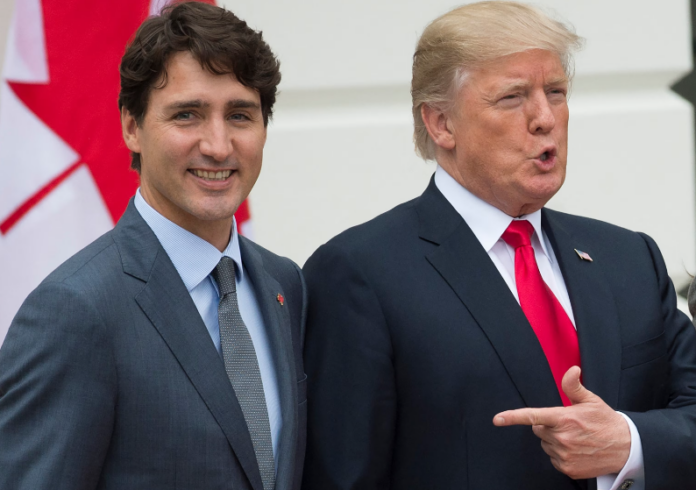Well, Donald Trump didn’t waste a second landing another punch on Canadian Prime Minister Justin Trudeau, this time mocking him as “Governor” after Finance Minister Chrystia Freeland’s surprise resignation. If Trudeau thought his week couldn’t get worse, Trump’s quip on Truth Social Monday night was the cherry on top: “The Great State of Canada is stunned as the Finance Minister resigns, or was fired, from her position by Governor Justin Trudeau.” It’s classic Trump—sharp, mocking, and completely undermining Trudeau’s already floundering leadership.
Freeland’s departure is a massive blow to Trudeau and a glaring signal of just how shaky his government has become. For years, Freeland was one of Trudeau’s most loyal and high-profile Cabinet members, particularly in matters of U.S.-Canada relations. Her resignation letter pulled no punches, citing irreconcilable disagreements with Trudeau on critical economic decisions—particularly how to handle Trump’s looming 25% tariff threat on Canadian imports.
Freeland made it clear: Trudeau’s approach to Trump’s “economic nationalism” is a losing strategy. “Our country today faces a grave challenge,” she wrote. “We need to take that threat extremely seriously.” And she wasn’t wrong. A 25% tariff on Canadian imports would devastate their economy, and Trudeau’s “costly political gimmicks”—like sales tax holidays and $250 handouts—are the kind of tone-deaf policies that make things worse, not better.
Here’s the reality: Freeland’s resignation exposes Trudeau’s inability to steer the ship in the face of real economic and geopolitical pressure. Trump is coming back into office like a freight train, promising to impose tariffs unless Canada and Mexico get serious about stemming illegal migration and drug trafficking. Instead of facing the issue head-on, Trudeau and his government look like they’re scrambling. Freeland’s frustration seems to stem from Trudeau’s failure to prioritize long-term fiscal stability over short-term political stunts.
Trump, for his part, has been relentless with Trudeau, taking swipes both serious and humorous. His earlier joke about Canada becoming the “51st state” and now dubbing Trudeau a “Governor” is Trump’s way of signaling exactly how weak and irrelevant he sees Trudeau’s leadership. It stings all the more when you consider the context—Trump, sitting down at Mar-a-Lago with Trudeau and Dominic LeBlanc, the man who is now Freeland’s replacement, had already made clear who’s in charge. And Trudeau? He walked away with a glossy Mar-a-Lago magazine, complete with ads for plastic surgery. You can’t make this stuff up.
The resignation also leaves Trudeau facing a storm on two fronts. At home, his Liberal Party is in disarray. Freeland’s exit is a major crack in Trudeau’s already fragile coalition. Many within his party don’t want him to run for a fourth term, and Freeland was seen as a potential successor. Without her, Trudeau has few high-profile allies left to defend his policies or navigate the mounting challenges.
On the international stage, Trudeau’s failures are even more glaring. Trump’s tariff threats are not empty bluster—they’re a clear warning shot. Freeland understood the gravity of the situation, calling Trump’s policies an “existential threat.” Trudeau, on the other hand, seems content to offer platitudes and hope it all blows over. Spoiler: it won’t. Trump’s America First economic agenda will force Canada into tough negotiations, and without a firm hand at the wheel, Canada risks becoming collateral damage in Trump’s second term.
Freeland’s resignation also exposes another ugly truth: Trudeau’s government can’t keep up with Trump’s momentum. Trump won re-election because he offered Americans a clear plan to tackle inflation, immigration, and economic stagnation—issues that remain Trudeau’s Achilles heel. Freeland wanted to prepare for the storm ahead; Trudeau refused. Now Canada is rudderless, facing threats from the world’s largest economy, and Trudeau looks weaker than ever.
And let’s be honest: the timing couldn’t be worse. Trudeau is up against history, as no Canadian prime minister in over a century has won four consecutive terms. With a federal election required by next October, his chances look grimmer by the day. His party is fracturing, his approval is plummeting, and now his strongest Cabinet member has jumped ship.


